
by Editor | Jul 22, 2024 | News
Dear President Ursula von der Leyen,
We are writing to extend our heartfelt congratulations on your re-election as President of the European Commission. Your leadership and unwavering commitment to peace and security have been exemplary, earning you the 2020 World Leader for Peace and Security Award.
Your re-election is a testament to your dedication and the trust placed in you by the European community and the European Union. As you continue to lead, we look forward to witnessing the positive impact of your vision and initiatives on growth, peace, and security in Europe and around the world.
The Boston Global Forum is committed to supporting your efforts in promoting peace and security. Under your leadership, we are confident that the European Commission will continue to advance these crucial objectives. We look forward to collaborating with you to achieve these shared goals.
With warmest regards,
Governor Michael Dukakis
Co-founder and Chair
Boston Global Forum
Nguyen Anh Tuan
Co-chair and CEO
Boston Global Forum

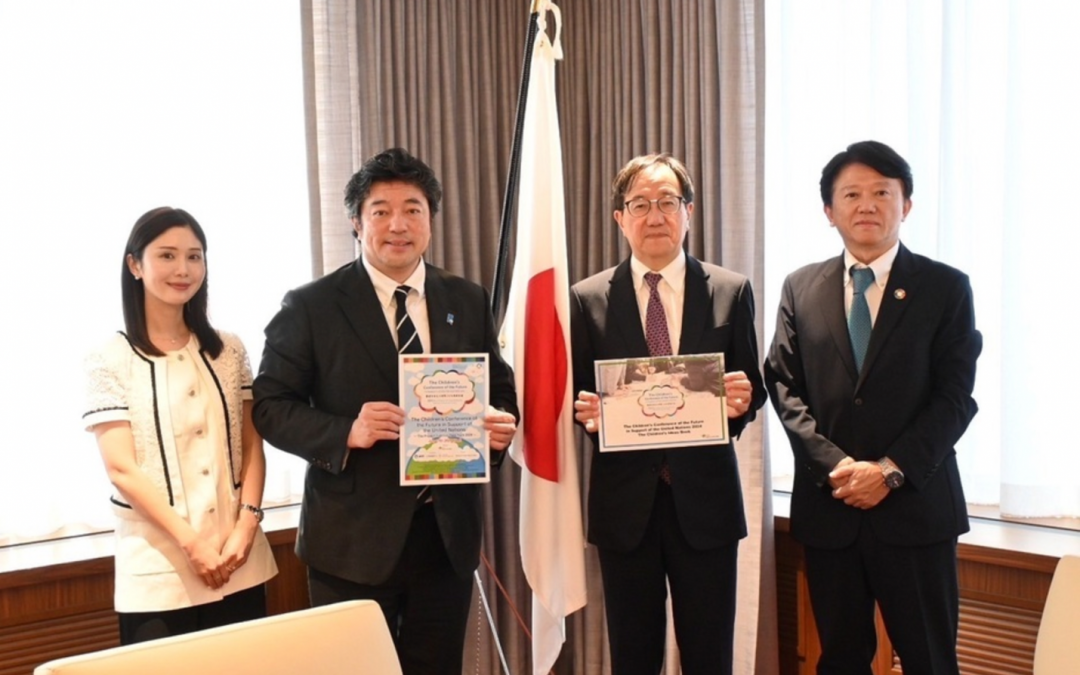
by Editor | Jul 22, 2024 | News
This article was originally published in Japanese on Tokyo Headline, and was translated to English using DeepL.
he Children’s Conference of the Future in Support of the United Nations ~The Project Launch Event in New York 2024~” will be held at the United Nations Headquarters DDR on July 17 (local time), the last day of the High Level Political Forum at the United Nations Headquarters in New York, USA. Conference of the Future in Support of the United Nations ~The Project Launch Event in New York 2024~” at the United Nations Headquarters DDR on July 17 (local time), Mr. Koji Ichiki, Representative Director of the Peace Communication Foundation, and Mr. Nakayama, former Vice Minister of Foreign Affairs and Mr. Yasuhide Nakayama, former Vice Minister of Foreign Affairs and Director for External Relations of the Foundation, visited Mr. Mikio Mori, Consul General and Ambassador of Japan in New York, at the Consulate General of Japan in New York on July 16, 2012.
During the visit, they discussed collaboration with the “Japan Parade,” which is held every May in New York to introduce and promote Japanese culture, including traditional culture such as taiko drumming and martial arts, as well as pop culture, in the year 2025.
On the same day, Ambassador Kazuyuki Yamazaki, Permanent Representative of Japan to the United Nations, visited the Permanent Mission of Japan to the United Nations in New York to thank the Permanent Mission of Japan for its cooperation in the “Global Children’s Future Conference in Support of the United Nations” ceremony and project events to be held at UN Headquarters on April 17, and to discuss the exchange between Alpha generation children including Japanese and children around the world. He also explained the exchange between children of the Alpha generation, including those from Japan, and those from around the world, the exchange of opinions on creating global experiences through UN Headquarters, and plans for 2025, and asked for their continued readiness for cooperation.


by Editor | Jul 7, 2024 | News
This week saw three notable elections occurring, all with varying levels of importance for the Four Pillars.
Labour has won the UK general election. Although not a formal member of the EU anymore (and Bre-enter does not seem to be a plausible policy as of now), a UK on the rebound is good for strengthening the Pillar of Europe (they are still a NATO member after all). Keir Starmer and the new cabinet is also continuing on the strong support for Ukraine since the invasion began. A reinvigorated UK from the lost decade would be a key in maintaining the rules-based order around the world.
Macron called the French parliamentary elections early, in a major gamble that could hand a gift to the far-right, which sought to disrupt cooperation and collaboration within the EU and also abroad (read: with regards to the Four Pillars). The first round forecasted that the gamble failed, but after the run-off, it seems that Macron was vindicated – RN and Marine Le Pen fell to third in the voting. This is good for continued cooperation of the Pillars, and further French and European support for Ukraine, as Macron recently has been a major advocate in regional and international security. The full implications of this outcome is still yet to crystalize though.
Iran now has a new president, replacing the now-deceased Ibrahim Raisi. A supposed reformer, it is to be seen if this is a real reformist turn, or faux platitudes by the state. Since the Green Movement in the country, voter turnout has been decreasing, a marker of illegitimacy of the authoritarian and theocratic state – the voice of the public is not represented in government. It is to be seen how this will affect relations between Iran and its allies and rivals – most likely not very impactful.
Article of the week – What NATO Means to the World [Foreign Affairs]

Minh Nguyen is the Chief Editor of the Boston Global Forum and a Shinzo Abe Initiative Fellow. She writes the Four Pillars column in the BGF Weekly newsletter.
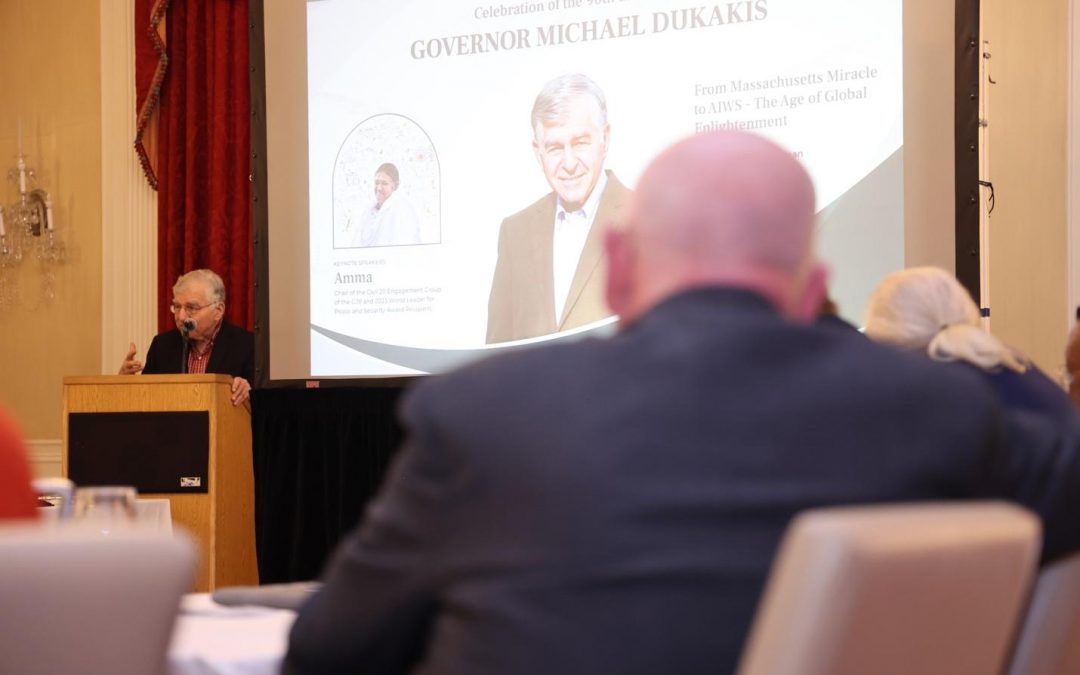
by Editor | Jul 7, 2024 | News
On July 4th, 2024, Governor Michael Dukakis, co-founder and Chair of the Boston Global Forum, and the BGF began a new initiative designed to inspire and guide the youth generation towards values of peace, security, compassion, and innovation. Named “Spiritual and Ethical Gifts,” this initiative seeks to encourage young people worldwide to contribute to a better and more humane society.
The inaugural gifts of this initiative are special e-cards featuring topics related to the AI World Society and its core principles. These e-cards will focus on AIWS’s commitment to fostering peace, enhancing security, nurturing compassion, and driving innovation. Each e-card will serve as a source of inspiration and education, encouraging recipients to embrace and practice these values in their daily lives and future endeavors.
This initiative reflects the BGF’s dedication to shaping futures through ethical AI development and fostering new models for democracy. By connecting with the youths, the BGF aims to not only plant technologically proficiency, but also humane and ethical values for the next generations.

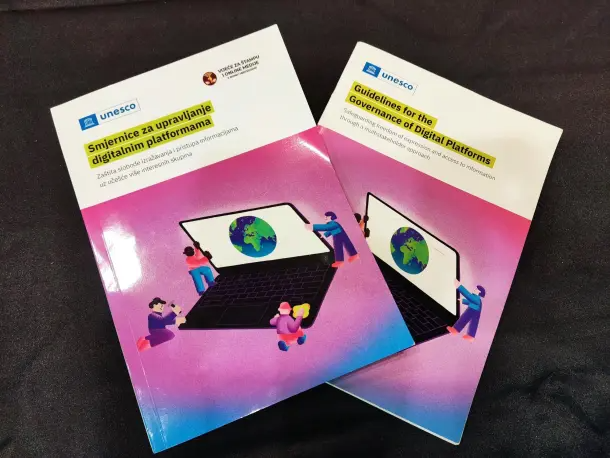
by Editor | Jul 7, 2024 | Global Alliance for Digital Governance
The full article on this UNESCO was published on its website.
As happens in different parts of the world, digital platforms in South-East Europe have certainly improved people’s access to information. However, they are also responsible for an increasing spread of harmful content, such as disinformation and hate speech, through human and automated systems. This threatens democracy, fuels conflict, hinders peacebuilding processes and undermines people’s right to access verified information, which is essential for quality public debate. These issues are particularly relevant in the Western Balkans, where the media sectors are deeply polarised and struggling for viability as concerns about media independence and integrity continue to undermine the credibility of journalism.
Within the “International Conference on the Digital Platform Governance: Building a Global Forum of Networks”, held in Dubrovnik on the occasion of the International Day for Countering Hate Speech (18 June), the Croatian Agency for Electronic Media (AEM) organised a roundtable titled “Digital platform governance through a multi-stakeholder and human rights based approach”. Supported by UNESCO, within the EU-funded project “Building Trust in Media in South-East Europe: Support to Journalism as a Public Good”, the roundtable brought together media regulatory authorities from UNESCO Member States including Albania, Bosnia and Herzegovina, Montenegro, North Macedonia and Serbia to exchange views on the governance of digital platforms, through a human-rights and multi-stakeholder based approach.
In his opening remarks, Tawfiq Jelassi, UNESCO Assistant Director-General for Communication and Information, noted referring to freedom of expression and access to information, that these fundamental rights are not just abstract ideals; they are vital tools in countering hate speech and empowering the communities targeted by it. “Independent regulatory authorities from South-East Europe play a key role in the governance of digital platforms, in line with human rights standards and through a multi-stakeholder approach,” he stated.

Maida Bahto Kestendžić/Press and Online Media Council BiH
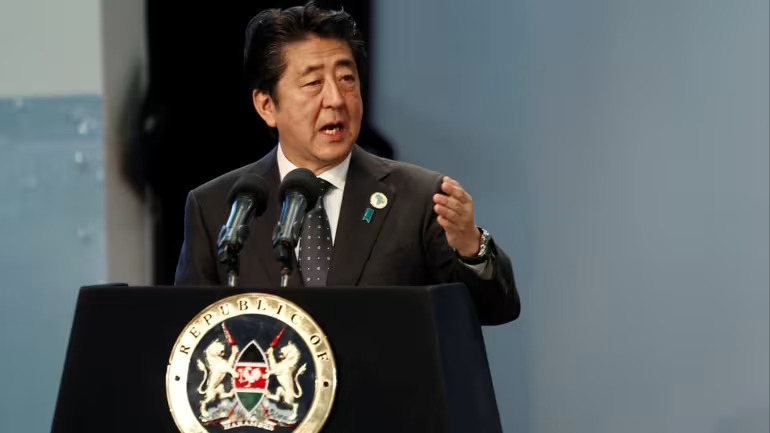
by Editor | Jul 7, 2024 | News
On July 8, 2022, the world was shocked and saddened by the tragic assassination of Japan’s former Prime Minister, Shinzo Abe. In the two years since this devastating event, the Boston Global Forum (BGF) has honored his legacy through the Shinzo Abe Initiative for Peace and Security. Launched on July 10, 2022, shortly after his untimely death, this initiative aims to advance global peace, security, and stability through collaborative efforts and innovative solutions.
The Shinzo Abe Initiative for Peace and Security was established to:
- Promote Global Peace: Foster dialogue and cooperation among nations to resolve conflicts and promote peace.
- Enhance Security: Develop strategies and frameworks to address global security challenges, including cyber threats and geopolitical tensions.
- Encourage Innovation: Support technological advancements that contribute to global stability and security.
Key Results and Impacts
In the two years since its inception, the Shinzo Abe Initiative has achieved significant milestones, including three Shinzo Abe Conferences held at Harvard University and in Tokyo in 2022, 2023, and 2024. These conferences produced Shinzo Abe Special Reports on Peace, Security, and new economic development strategies for Japan, emphasizing cooperation among the four pillars: the US, Japan, India, and the EU. Additionally, the initiative has focused on reinventing Silicon Valley for the Age of AI and the AI World Society.
On June 21, 2024, the Boston Global Forum, Shinzo Abe Initiative, and Wilson Center launched the Indo-Pacific Spark Initiative, fostering special economic and political relations between the US, Japan, India, and Vietnam. This effort continues Prime Minister Shinzo Abe’s visionary Indo-Pacific strategy with the support of partners like the Boston Global Forum and Wilson Center. With contributions from distinguished leaders and thinkers, the Indo-Pacific Spark Initiative aims to make significant strides in promoting peace, security, and development.
The Boston Global Forum remains dedicated to advancing the ideals and vision of Prime Minister Shinzo Abe, ensuring that his legacy continues to inspire efforts toward a more peaceful and secure world.

Shinzo Abe first talked of the concept of a free and open Indo-Pacific region at the 2016 Tokyo International Conference on African Development. © Reuters
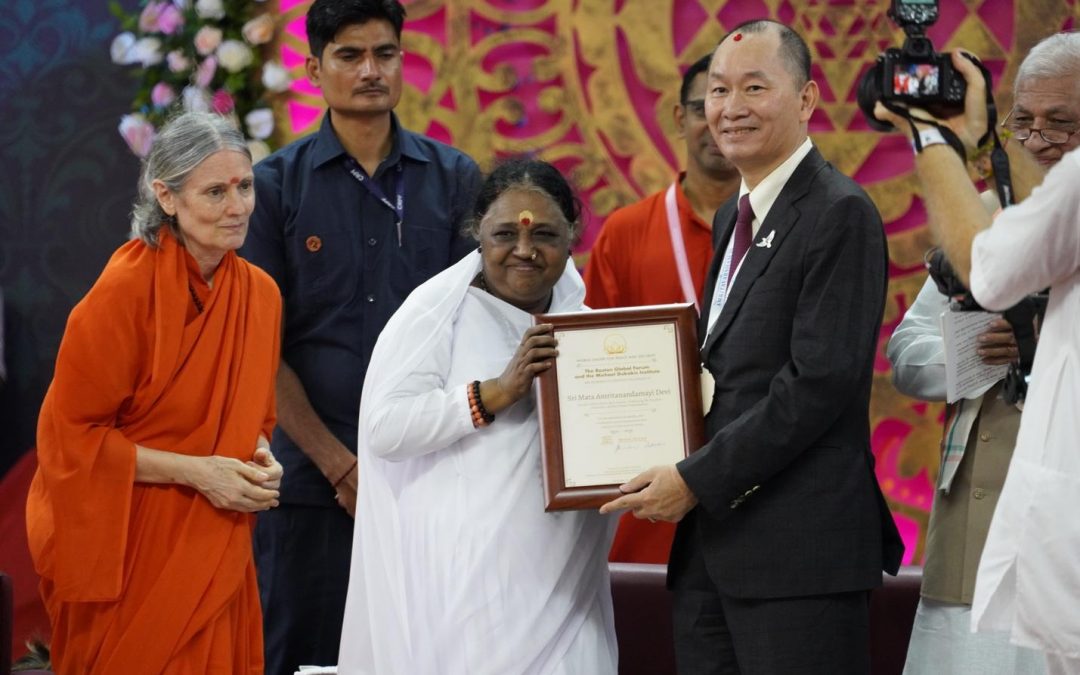
by Editor | Jul 7, 2024 | News
Amma will be visiting the United States from July 4 – August 11, in her first international tour since 2019. Amma will be conducting free public programmes in every city on her tour schedule. The programmes include a meditation guided by Amma, spiritual discourses by Amma and her disciples, bhajans (devotional singing) led by Amma in a call and response format, and the opportunity to meet Amma personally and receive her darshan (embrace).
Amma will also be holding spiritual retreats in a number of cities. The retreats offer a transformative opportunity to immerse oneself in Amma’s presence over three days, and include additional programs like a question-and-answer session with Amma, classes with Amma’s disciples and devotees on bhajans, meditation, yoga, and service opportunities.
https://amma.org/news/announcing-ammas-2024-us-tour/
https://us.amma.org/meeting-amma/ammas-north-america-tour
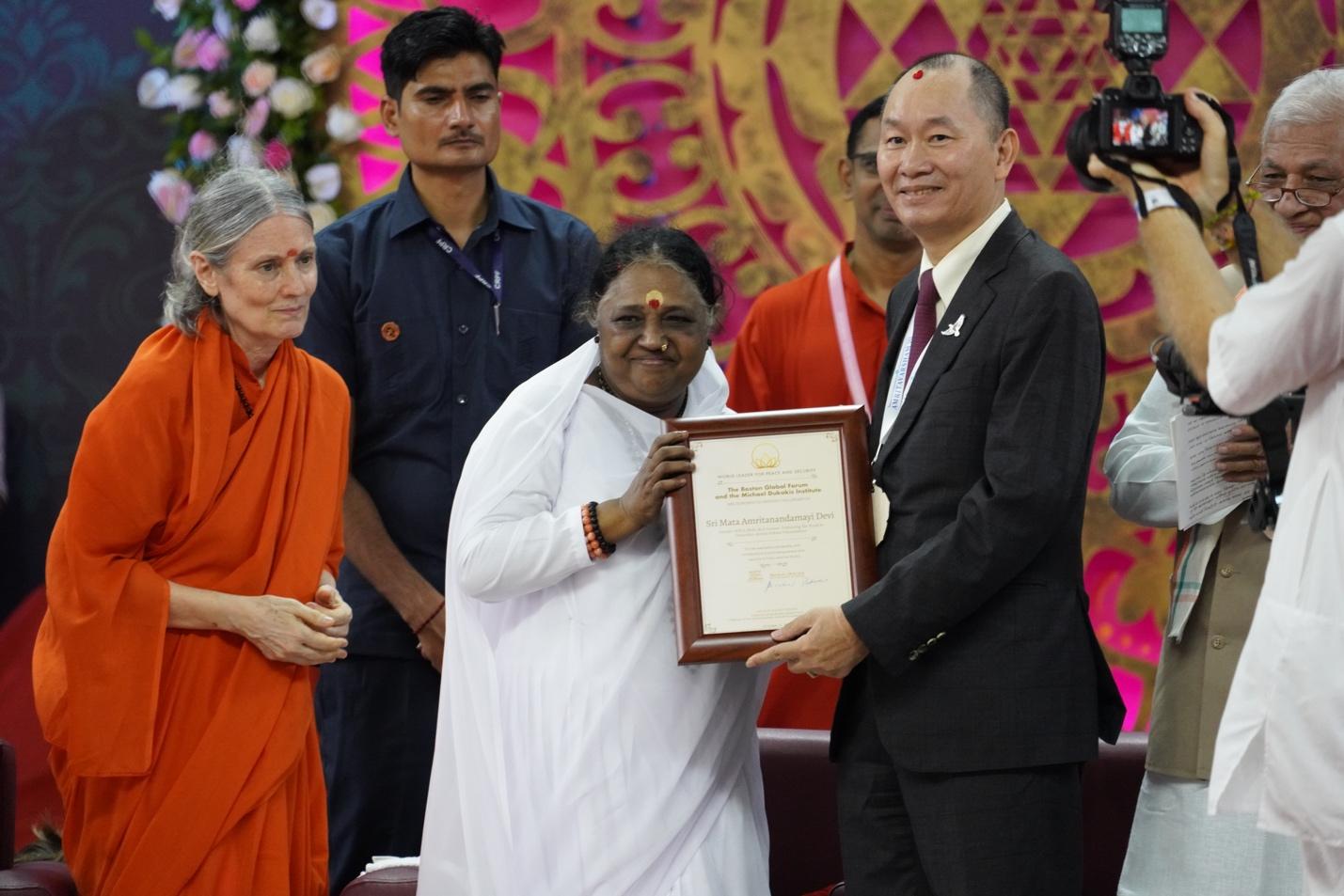
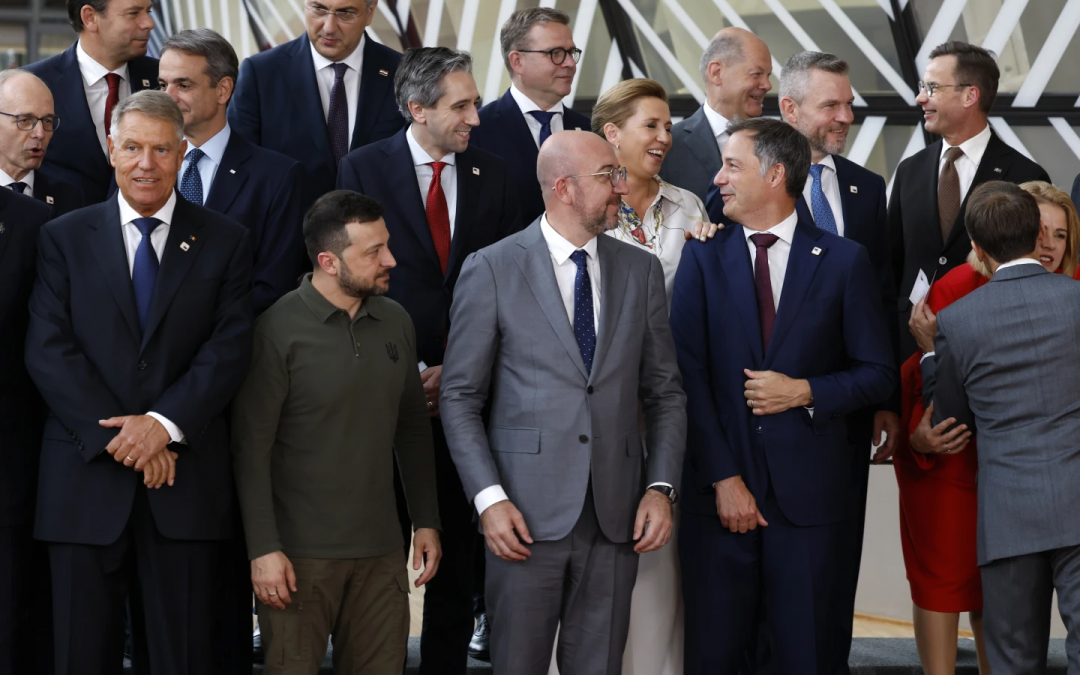
by Editor | Jul 1, 2024 | News
There were some “events” so to say that did happen this week… but we don’t cover electoral politics that aren’t end results, we will leave that to the analysts and experts in that field. Plus, there are still other Pillars to discuss.
The theme of US-India cooperation has been a recurring piecemeal theme in recent editions of Four Pillars, and it appears yet again this week. Rumor from the grapevines has it that the two Pillars are discussing cooperation on co-production of Javelin anti-tank missiles. In recent conflicts, this weapons system entered the popular consciousness through the Ukrainian Armed Forces’ usage of it against the Russian invasion. I will not waste too many words since we have analyzed these kind of cooperation in recent editions, but it is great to see continued work between these two Pillars, as the Indo-Pacific region continue to slowly boil into live conflict with rising tensions,
The EU, one of the Pillars, held a summit over the week after the European Parliamentary elections, partially to confirm the next batch of the bloc’s top bureaucrats and leaders, and also to convene the 27 member states to discuss ongoing issues within Europe and abroad, from defense to the bloc’s competitiveness. Ursula von der Leyen, BGF Peace and Security Award 2020 Recipient and the incumbent European Commissioner, secured her second term in the position, and will be joined by Estonian PM Kaja Kallas as EU Foreign Policy chief and former Portuguese PM Antonio Costa as European Council President. Also confirmed but separate from the EU appointments was Dutch PM Mark Rutte set to become the next NATO Secretary General, succeeding Jens Stoltenberg.
This EU gathering also marked the beginning of accession talks for Moldova and Ukraine, as announced by the EU earlier in the month. Ukraine signed security agreements with Poland and the EU, similar to the one Zelenskyy signed with the US at the G7 Summit. This is good in ensuring support for Ukraine in their struggle against not just Russia, but the alliance of Russia-China-North Korea, and thus a struggle against the backslide into global authoritarianism and an international state of nature.
Article of the week – America falters in fighting the information war [Axios]

(AP Photo / Geert Vanden Wijngaert)
Minh Nguyen is the Chief Editor of the Boston Global Forum and a Shinzo Abe Initiative Fellow. She writes the Four Pillars column in the BGF Weekly newsletter.
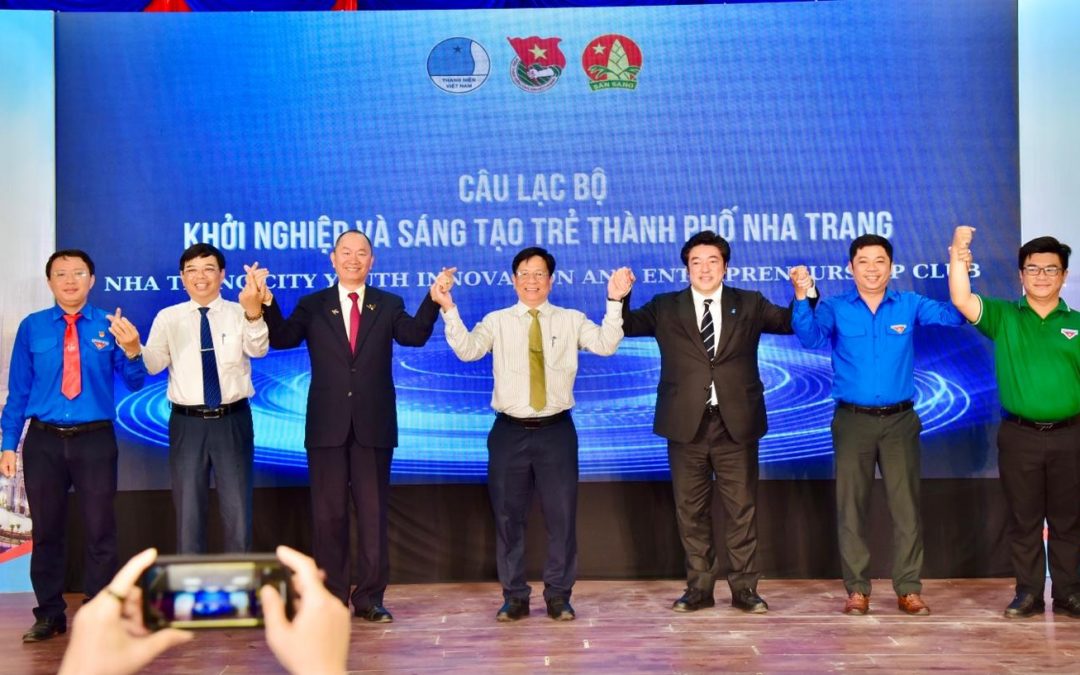
by Editor | Jul 1, 2024 | Event Updates, News
On June 26, the Nha Trang Government inaugurated the Youth Innovation and Entrepreneurship Club, marking a significant milestone for the city’s youth empowerment initiatives. The ceremony was graced by Mr. Ho Van Mung, Alternate Member of the Party Central Committee and Secretary of the Nha Trang City Party Committee, along with Mayor Nguyen Sy Khanh. Among the distinguished guests were Mr. Nguyen Anh Tuan, CEO of the Boston Global Forum, and Mr. Yasuhide Nakayama, Former Foreign State Minister of Japan and member of the Boston Global Forum’s Board of Executives. The Nha Trang City Youth Innovation and Entrepreneurship Club aims to harness scientific research and foster innovative startup activities through collaboration with individuals and organizations. Central to its mission is the cultivation of creativity, entrepreneurial spirit, and innovation among union members, teenagers, pupils, and students. The club seeks to operationalize the “Creative Youth” movement and support the “Accompanying Young People in Business Startups” program, facilitated by the Central Youth Union. It also aims to provide a platform for city youth and union members to converge, learn, exchange ideas, and foster entrepreneurial endeavors. During the launch event, union members and young participants engaged in lively discussions with invited delegates, focusing on startup ventures and innovation initiatives. International delegates from the Boston Global Forum shared insights and experiences, enriching the dialogue with their perspectives on global entrepreneurship trends. At the ceremony, Mr. Nguyen Anh Tuan, CEO of BGF, delivered an inspiring message to the people of Nha Trang, emphasizing that every citizen is an innovator. He presented a symbolic Boston-Nha Trang picture, a gift from Governor Michael Dukakis, Chair of BGF, to the government and people of Nha Trang City, symbolizing the strong ties and shared aspirations between the two cities. Looking ahead, the Boston Global Forum and AI World Society have pledged their support to nurture youth innovators within the club, facilitating access to AIWS ideas and connections within the Boston innovation community. This collaboration underscores a shared commitment to fostering innovation and empowering the next generation of leaders in Nha Trang City.
https://baokhanhhoa.vn/xa-hoi/202406/ra-mat-cau-lac-bo-khoi-nghiep-va-sang-tao-tre-thanh-pho-nha-trang-e310116/




















